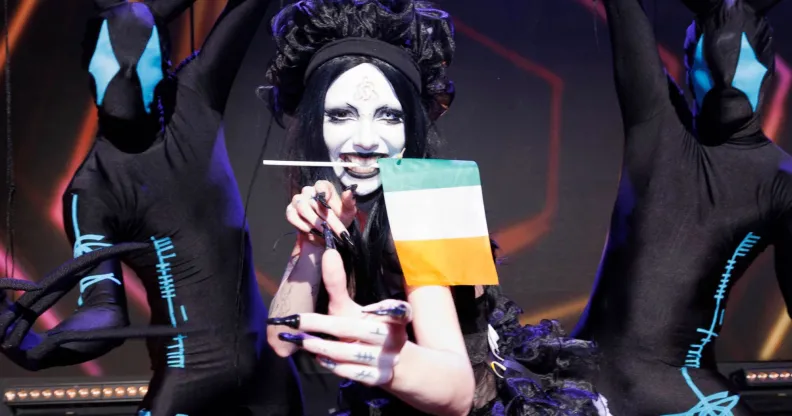Eurovision 2024: Non-binary pop star Bambie Thug to represent Ireland

Non-binary artist Bambie Thug will represent Ireland at the Eurovision Song Contest. (Andres Poveda)
Self-described “ouija pop” star Bambie Thug will represent Ireland at the Eurovision Song Contest, becoming the country’s first ever non-binary act at the competition.
On Friday (26 January), Bambie Thug performed alongside five other Eurovision hopefuls on RTÉ’s The Late Late Show, before members of the public in Ireland and the UK voted for their favourite.
A national and international jury also had their say, with Bambie Thug, who uses they/them pronouns, coming out on top.
Bambie Thug will enter the contest with their song “Doomsday Blue” from their 2023 EP, Cathexis, and will travel to Malmo in Sweden for the semi-finals in May.
“I don’t know how I feel – I feel incredible,” the Cork-born artist told The Late Late Show host Patrick Kielty after winning the vote.
“My words are gone. As a lyricist you’d think I’d have more to say but I’m speechless – I’m so excited and I promise I’m going to do you so proud.”
In a conversation with PinkNews in November, Bambie opened up about how realising they are non-binary changed their approach to music.
“I allowed myself to be more free as a person and therefore more free in my music,” they shared.
“Bambie Thug the project is two-and-a-half years old now, and it’s been steadily going up… Something in the universe said, ‘OK, now you have aligned. You are ready’.”
Reflecting on trans and non-binary representation in the music industry, Bambie, who is an independent artist, admitted that it’s difficult to see LGBTQ+ artists sidelined.
“I could argue that I’m one of the best acts in the UK industry” Bambie shared, “and I still haven’t got any offer of signing or any publishing offers.”
“It is annoying because culture comes from the queer community. I would like to see more of us in the spotlight because there are a lot of incredible artists who don’t get the light as much as cis people.”
If there is one space in the music industry that has always welcomed LGBTQ+ artists, it’s the Eurovision Song Contest.
In 1998, Dana International became the first trans artist to win the contest, while some of Eurovision’s most historic winners, including Katrina and the Waves, Conchita Wurst, and 2023 winner Loreen, all identify as LGBTQ+.
Queer British pop star Olly Alexander, from band Years & Years, will represent the UK this year.
The Eurovision semi-finals will take place on 7 and 9 May, with the live final airing on Saturday 11 May.
How did this story make you feel?

